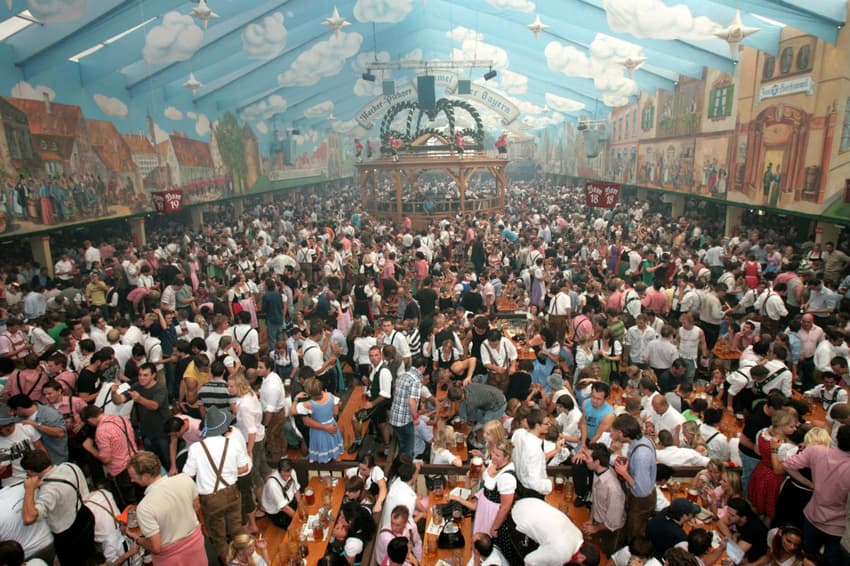Germany's Oktoberfest 2020 cancelled over coronavirus pandemic

Germany's Oktoberfest beer festival will be cancelled this year as "risks are too high" from the novel coronavirus, Bavarian state premier Markus Söder said Tuesday.
The event, which takes place annually in late September, would be too dangerous "as long as there is no vaccine", Söder said.
Even with masks and social distancing, the risk would be too high, he said, adding, "living with the coronavirus means living carefully".
Germany has banned major events until August 31st as part of measures to slow down the spread of coronavirus.
The festival, which dates back to 1810, had been scheduled to take place from September 19th until October 4th. However, there had been a question mark over Oktoberfest going ahead since it's such a huge event.
Around six million visitors in total attend the event, also known as Wiesn, in Munich every year.
The local economy generated more than €1.2 billion thanks to Oktoberfest in 2018, according to the economic department of the Bavarian state capital.
Söder, of the CSU, and Munich's Mayor Dieter Reiter, of the Social Democrats, announced in a press conference that the event was cancelled this year.
"We want to continue to protect Bavaria," Söder said. 2020 is "a year, unfortunately, without Wiesn," he added.
Schwere Entscheidung mit Münchens OB Dieter Reiter: Das Oktoberfest 2020 muss ausfallen. Das Risiko ist einfach zu hoch. Man kann dort weder Abstand halten noch Mundschutz tragen. Mit Corona zu leben, heißt vorsichtig zu leben, bis es Impfstoff oder Medikamente gibt. #wiesn pic.twitter.com/AMHpQAjIL0
— Markus Söder (@Markus_Soeder) April 21, 2020
READ ALSO:
-
Germany bans major events until end of August: What you need to know
-
Oktoberfest in numbers: An inside look at Germany's multi-billion business
Before the cancellation, Söder had said he was sceptical about whether a festival of this size could take place during the pandemic.
Oktoberfest has been cancelled before due to major outbreaks.
 Archive photo shows groups drinking beer at Oktoberfest. Photo: DPA
Archive photo shows groups drinking beer at Oktoberfest. Photo: DPA
Due to cholera, the festival was cancelled in 1854 and 1873. And during wartime, the beer festival did not go ahead. It was also put on pause during hyperinflation in 1923.
READ ALSO: Bavaria - How Germany's worst-hit state is emerging from coronavirus lockdown
Why are events banned at the moment?
In new guidelines published last Wednesday, the government said large-scale events "play a major role in the dynamics of infection".
Experts have repeatedly said that close-contact social gatherings have contributed to the spread of coronavirus.
Large outbreaks, such as that in Heinsberg, North Rhine-Westphalia, have stemmed from social gatherings. In this area, a carnival event is thought to have fuelled the spread of Covid-19 in communities.
This ban on events therefore helps to contain the spread of coronavirus and at the same time provides some clarity for organisers and consumers.
Comments
See Also
The event, which takes place annually in late September, would be too dangerous "as long as there is no vaccine", Söder said.
Even with masks and social distancing, the risk would be too high, he said, adding, "living with the coronavirus means living carefully".
Germany has banned major events until August 31st as part of measures to slow down the spread of coronavirus.
The festival, which dates back to 1810, had been scheduled to take place from September 19th until October 4th. However, there had been a question mark over Oktoberfest going ahead since it's such a huge event.
Around six million visitors in total attend the event, also known as Wiesn, in Munich every year.
The local economy generated more than €1.2 billion thanks to Oktoberfest in 2018, according to the economic department of the Bavarian state capital.
Söder, of the CSU, and Munich's Mayor Dieter Reiter, of the Social Democrats, announced in a press conference that the event was cancelled this year.
"We want to continue to protect Bavaria," Söder said. 2020 is "a year, unfortunately, without Wiesn," he added.
Schwere Entscheidung mit Münchens OB Dieter Reiter: Das Oktoberfest 2020 muss ausfallen. Das Risiko ist einfach zu hoch. Man kann dort weder Abstand halten noch Mundschutz tragen. Mit Corona zu leben, heißt vorsichtig zu leben, bis es Impfstoff oder Medikamente gibt. #wiesn pic.twitter.com/AMHpQAjIL0
— Markus Söder (@Markus_Soeder) April 21, 2020
READ ALSO:
- Germany bans major events until end of August: What you need to know
- Oktoberfest in numbers: An inside look at Germany's multi-billion business
Before the cancellation, Söder had said he was sceptical about whether a festival of this size could take place during the pandemic.
Oktoberfest has been cancelled before due to major outbreaks.
 Archive photo shows groups drinking beer at Oktoberfest. Photo: DPA
Archive photo shows groups drinking beer at Oktoberfest. Photo: DPA
Due to cholera, the festival was cancelled in 1854 and 1873. And during wartime, the beer festival did not go ahead. It was also put on pause during hyperinflation in 1923.
READ ALSO: Bavaria - How Germany's worst-hit state is emerging from coronavirus lockdown
Why are events banned at the moment?
In new guidelines published last Wednesday, the government said large-scale events "play a major role in the dynamics of infection".
Experts have repeatedly said that close-contact social gatherings have contributed to the spread of coronavirus.
Large outbreaks, such as that in Heinsberg, North Rhine-Westphalia, have stemmed from social gatherings. In this area, a carnival event is thought to have fuelled the spread of Covid-19 in communities.
This ban on events therefore helps to contain the spread of coronavirus and at the same time provides some clarity for organisers and consumers.
Join the conversation in our comments section below. Share your own views and experience and if you have a question or suggestion for our journalists then email us at [email protected].
Please keep comments civil, constructive and on topic – and make sure to read our terms of use before getting involved.
Please log in here to leave a comment.